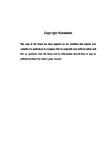The Effects of Ageing, Individual Differences and Limited Resources on Consumer Decision Making
| dc.contributor.supervisor | Handley, Simon | |
| dc.contributor.author | Kerss, Jennifer Marie | |
| dc.contributor.other | Faculty of Science and Engineering | en_US |
| dc.date.accessioned | 2013-05-21T10:22:43Z | |
| dc.date.available | 2013-05-21T10:22:43Z | |
| dc.date.issued | 2013 | |
| dc.date.issued | 2013 | |
| dc.identifier | 200958 | en_US |
| dc.identifier.uri | http://hdl.handle.net/10026.1/1470 | |
| dc.description.abstract |
This thesis presents six original experiments investigating the relationship between age-related gains and losses in cognitive and emotional abilities and consumer decision making. Novel tasks designed to closely resemble real consumer decisions were used to assess how older and younger adults fare when making everyday decisions. Experiments 1 and 2 examined the relationship between consumer decision making and measures of fluid intelligence, crystallised intelligence and numeric ability in older and younger adults. The data revealed that numeric ability and fluid intelligence independently predicted consumer decision making in older adults. In Experiment 1, participants made factual and inferential decisions about utility suppliers. Findings were corroborated in Experiment 2 using a larger sample and an additional consumer decision task based on selecting a mobile phone provider. Experiment 2 also revealed numeric ability as an independent predictor of young adult’s consumer decision making. Experiment 3 assessed the interplay between age, cognitive resources and emotion regulation. Cognitive resources were assessed by the number of times older and younger adults decided to stick with a pre-selected option, switch to an alternative option or decide in the future. Results suggested that older and younger adults required differing amounts of resources to regulate emotions in accordance with different emotion regulation strategies. Older adults made better consumer decisions when instructed to regulate their emotions by way of reappraisal and younger participants made better consumer decisions when instructed to regulate their emotions using suppression. These results were contrary to what was expected based on previous research on emotion regulation. Because of this, two exploratory experiments were conducted on young adults in an attempt to identify a reliable methodology for inducing and measuring affects more typically associated with self-regulation. These experiments revealed some surprising findings. Participants exposed to manipulations high in terms of cognitive demand made better subsequent consumer decisions than participants placed in less demanding conditions. It was hypothesised that participants exposed to demanding manipulations were primed to make more adaptive consumer decisions. A final experiment tested the effect of age and instruction manipulation on consumer decision making. The relationships between cognitive measures of individual differences and decision making were again measured. Results substantiated previous findings revealed in Experiments 1 and 2 insofar that fluid intelligence was found to independently predict consumer decision making performance in older adults. Fluid intelligence and numeric ability predicted consumer decision making in younger adults. In terms of instruction effects, younger and older adults made better decisions when asked to do so in a rational manner compared to an intuitive manner. It is believed that this work represents some of the first of its kind to study the impact of ageing on cognitive ability and decision making using tasks representative of existing consumer decisions in terms of context and response options. The findings presented provide a valid and unique insight into how cognitive and emotional ability changes with age and the subsequent implications this has when making consumer decisions. This thesis concludes with the theoretical and practical implications for the ageing consumer. | en_US |
| dc.language.iso | en | en_US |
| dc.publisher | University of Plymouth | en_US |
| dc.subject | Individual Differences | |
| dc.subject | Consumer Decision Making | |
| dc.subject | Ego-Depletion | |
| dc.subject | Emotion-Regulation | |
| dc.subject | Age | en_US |
| dc.title | The Effects of Ageing, Individual Differences and Limited Resources on Consumer Decision Making | en_US |
| dc.type | Thesis | |
| plymouth.version | Full version | en_US |
| dc.identifier.doi | http://dx.doi.org/10.24382/4932 |
Files in this item
This item appears in the following Collection(s)
-
01 Research Theses Main Collection
Research Theses Main


